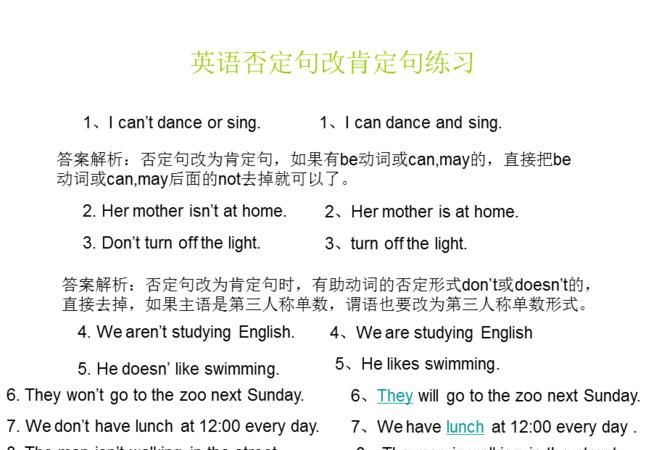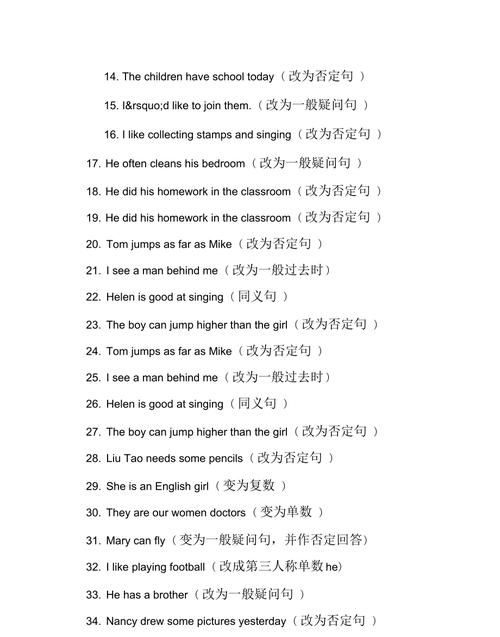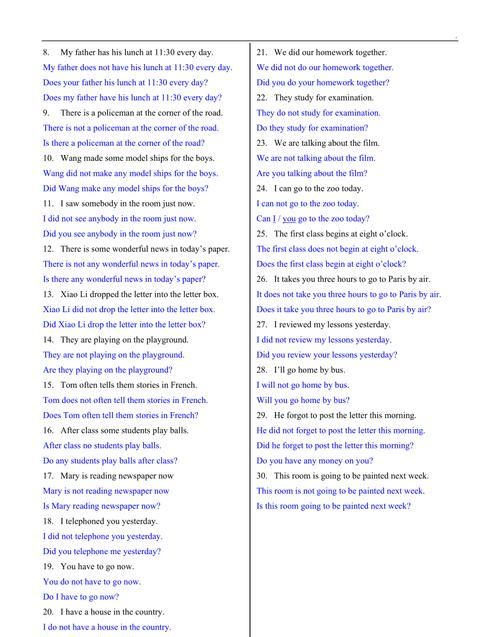本文目录
英语祈使句肯定句和否定句怎么写
一.肯定句:是指用肯定的语气来陈述的句子。
例:
This is my pen。
这是我的笔。
He works in a hospital。
他在医院工作。
There are four fans in our classroom。
我们教室里有四个风扇。
二.否定句:含有否定词或表示否定意义词的句子。
例:
This is not my pen。
这不是我的笔。
He does not (doesn’t) work in a hospital。
他不在医院工作。
There are not (aren’t) four fans in our classroom。
我们教室没有四个风扇。
三.肯定变否定,有以下2种情况
1.有am / is / are,就在它们后面加 not。
am → am not
is → is not
are → are not
比如:
I am a girl。→ I am not a girl。
我是女孩。→我不是女孩。
2.没有 am / is /are, 但有表示动作的动词(比如eat),就在动词前加 don't 或 doesn't, 动词为原形。
V原→ don't + V原
V(-s, -es结尾) → doesn't + V原
eat → don't eat
eats → doesn't eat
比如:
I drink cola。→I don't drink cola。
我喝可乐。→我不喝可乐。
She drinks cola。→ She doesn't drink cola。
她喝可乐。→她不喝可乐。

扩展资料
一.否定句主要是在肯定句的基础上加上了否定词 “not”。
二.有动词be的句子则“not”加在be后面,可缩写成“isn’t,aren’t”,但am not 一般都分开写。
三.没有动词be的句子则要先在主要动词的前面加上一个助动词(do,does,did),然后在它后面加上“not”,你也可以把它们缩写在一起如“don’t , doesn’t , didn’t )。
四.上面三个助动词要根据人称和时态来选择,其中“does”只用于一般现在时主语是第三人称单数的情况,而“did”只用于一般过去时,不论主语是什么人称和数,都用“did” 。
部分否定句和全部否定句
1.He does not come to school early.
2.He doesn't listen to his teacher carefully.
3.He is not a good student.
4.He isn't a group leader.
5.He doesn't like to set the dinner table.
6.He doesn't watch TV the whole evening.
7.He doesn't read in bed.
8.He doesn't go to bed very late.
9.The pens aren't red.
10.We have no money.
11.I don't like English.
不要抄哦

二十道肯定句变否定句英语
1. There is not a moment to be lost. 分秒必争。
2. There is no holding back the wheel of history. 历史车轮不可阻挡。
3. Not a soul was anywhere visible. 到处见不到一个人。
4. I felt sorry for not coming in time. 我很抱歉没准时到。
5. I don’t think it is right to make such a hasty decision. 我认为如此仓促做决定是不正确的。
6. Everybody, it is true, wouldn’t like it. 的确并不是人人都喜欢它。
7. I don’t wholly agree. 我并不完全同意。
8. All my plans came to nothing. 我的一切计划都没实现。
9. I shall never do it, not under any circumstances. 我不会做那事的。
10. I’ll not do such a thing, not I. 我不会干这种事的,决不会。
11. I could not assent to, much less participate in such proceedings. 我对这种行为不能赞同,哪里还说得上参加。
12. I did not even see him, still less shake hands with him. 我看都没看见他,哪里还可能同他握手呢?
13. I never thought of it, let alone did I do it. 我想都没想到它,更谈不上去做了。
14. Little remains to be said. 简直没什么可说的了。
15. I have hardly ever been out of Beijing. 我几乎未曾离开过北京。
16.I saw little or nothing of him after you were gone. 你走后我很少看见他,几乎可说完全没见过他。
17. I could not help showing my pleasure. 我不禁喜形于色。
18. I cannot but admire his courage. 我不得不赞美他的勇气。
19. I never see you but I think of my brother. 我每次见到你就想起我的兄弟来。(我没有一次不是见到你就想起我的兄弟来。)
20. It simply will not do. 那是绝对不行的。

英语否定句句子30个
否定句分很多种,我就举些例子吧.
1.cannot/couldn’t或can /could +否定词(not,never,hardly,scarcely)too以及比较级等等。
I can’t wait to see him.我盼望着能早点见到他。
I could not feel better.我感觉再好不过了。
You cannot overemphasize the importance of it.其重要性无论怎么强调也不过分。
2.否定词(no,not,little,nothing,none,nobody)与 but,except等连用。
It leaves nothing to be desired.这已完美无缺。
Nobody but Peter can do it well.只有彼得才能做好这件事。
二、使用一些特殊的句式。
1.否定的一般疑问句。
Don’t you think we should try again?难道你不认为我们应该再试一试吗?
2.特殊疑问句。
There is a lift,but why not use the lift?既然有电梯,为什么不用呢?
3.过去时的no sooner...than句型。
No sooner had she got to Guangzhou,she called me.她一到广州就给我打了个电话。
4.too...to句型。
I’m only too glad to help you.能为您效劳,我高兴极了。
5.虚拟语气。
If I haven’t lost my watch!我的表要是不丢该多好!
6.含有not+表瞬间动作的动词+ till/until短语或从句。
We can’t go until Thursday.我们要到星期四才能去。
7.双重否定句。
There is no smoke without fire.无风不起浪。
理解肯定形式的否定意义借助一些词汇、短语和句型。
一、词汇和短语手段。
1.在名词及短语中,常见的有absence of(缺席,缺乏),stranger(陌生人)等。
Darkness is the absence of light.黑暗就是缺乏光亮。
2.动词及短语有escape(from)(逃过),ignore(忽略),lost(丢失)等。
I lost my book after getting offthe bus without it.当我没带书下了公共汽车之后才发觉把书丢了。
3.形容词及短语有last(不愿意的),deaf to(不听),blind to(看不见)等。
He is the last man I want to see.我最不愿意见到他。
4.介词及短语except,instead of, but,beyond,above,past等。
It’s quite beyond me(above me,past me,beyond my depth).这个我理解不了。
二、常用否定句型
1.too...to...,too...for...
That’s too much for me.这我可受不了啦。
2.stop(prevent,keep,hinder,protect,save,prohibit,dissuade)...(from)...
Smoking is prohibited in most theaters.在大多数戏剧院里禁止吸烟。
3.虚拟语气句。
You should(ought to)have done it better.你本应做得更好。(还不够好)
I could have come earlier.我本来能早点来的。(实际上没有早来)
I wish he were here now.我希望他现在能在这儿。(实际上他不在)
If I only knew!要是我知道该多好。(实际上不知道)
They would rather die than surrender.他们宁死不降。
4.用before引导的从句表示"来不及……,不等,未……先……,以防等否定含义。
Put on more clothes before you catch cold.多穿点衣服以防感冒。
5.预先安排的事未办到或计划落空。
I had hoped to save some more money to buy a new car.我本希望多攒点钱买辆新车。
6.用比较级句型表否定。
He knows more than he lets on.这件事他了解得很多,但不肯承认。
I know better than to believe him.我才不相信他那一套呢。
希望对你有帮助

以上就是关于英语否定句例句0句六年级 ,英语祈使句肯定句和否定句怎么写的全部内容,以及英语否定句例句10句六年级 的相关内容,希望能够帮到您。
